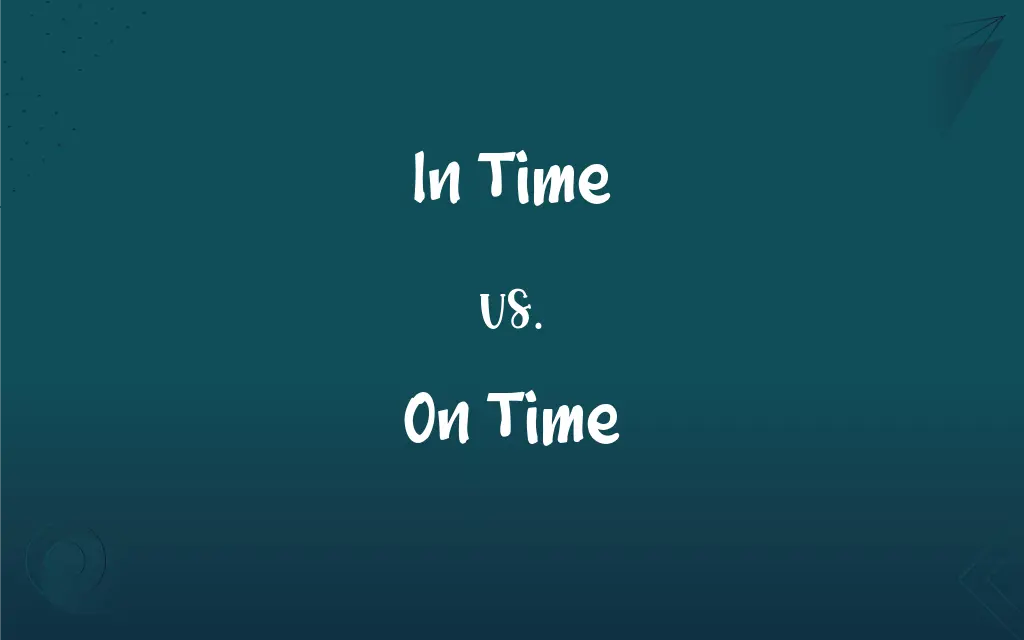In Time vs. On Time: What's the Difference?
Edited by Janet White || By Harlon Moss || Published on November 30, 2023
"In time" means sufficiently early or within a certain period, while "on time" means punctually at the specified or expected time.

Key Differences
"In time" and "on time" are phrases that often pertain to punctuality and timelines, but each carries its unique nuances and uses in the English language. At their core, they address different aspects of time management and events.
"In time" typically refers to doing something early enough or within a certain timeframe, possibly preventing an undesired outcome. For instance, when you arrive just minutes before a train departs, you're there "in time" to catch it. This phrase often carries an element of relief or just barely making it within an acceptable range.
Contrastingly, "on time" speaks directly to punctuality. It denotes that something happened or will happen at the precise time expected or scheduled. If a meeting is set for 9 AM and starts at that exact moment, it started "on time." This phrase emphasizes precision and adherence to a specific moment.
Another way to look at the difference between "in time" and "on time" is by considering their flexibility. "In time" has a more flexible connotation, suggesting there's a window or range within which something can occur. "On time," however, implies strict punctuality, with no room for deviation from the specified moment.
In essence, while both phrases are related to timing, "in time" is about meeting a deadline or window of opportunity, and "on time" emphasizes strict punctuality and precision.
ADVERTISEMENT
Comparison Chart
Primary Meaning
Within a certain period or before a deadline
Punctually at the specified or expected time
Connotation
Flexibility, just before a deadline
Precision, punctuality
Examples
Arrive in time for a movie
The bus arrived on time
Associated Feelings
Relief, barely making it
Adherence to schedule, reliability
Usage
Can indicate prevention of undesired outcomes
Indicates events happening as scheduled
ADVERTISEMENT
In Time and On Time Definitions
In Time
Denoting a period leading up to an event.
Just in time, they managed to finalize the plans.
On Time
Denoting adherence to a set schedule.
The project was completed on time.
In Time
Early enough to prevent something.
He got to the dam in time to prevent the flood.
On Time
Without any delay; punctually.
He's known for always being on time for meetings.
In Time
Before a deadline or event.
She arrived in time for the concert.
On Time
At the scheduled or expected time.
The train always arrives on time.
In Time
Eventually; after a duration.
With practice, you'll get better in time.
On Time
At the precise moment expected.
She walked in right on time for her interview.
In Time
Within an acceptable range of an expected time.
The doctor said he'd be there in time for the surgery.
On Time
Indicating no deviation from a timetable.
The event started on time and ended as planned.
On Time
.
An on-time delivery
FAQs
Can "in time" mean eventually?
Yes, as in "You'll understand in time."
If a train arrives as per its schedule, did it arrive in time or on time?
It arrived "on time."
Does "on time" mean punctually?
Yes, "on time" denotes punctuality and adherence to a specified time.
If someone prevents an accident by arriving quickly, did they arrive in time or on time?
They arrived "in time."
Is "in time" more flexible than "on time"?
Yes, "in time" suggests a range or window, while "on time" implies precision.
Which phrase indicates strict punctuality?
"On time" indicates strict punctuality.
If an event starts at 5 PM sharp, did it start in time or on time?
It started "on time."
Can "on time" be used in the context of deadlines?
Yes, as in "The project was finished on time."
If a bus follows its timetable, is it in time or on time?
It is "on time."
When should I use "in time"?
Use "in time" when referring to doing something within a certain timeframe or before a deadline.
Can "in time" suggest a sense of relief?
Yes, especially when something is done just before a deadline.
If a meeting starts as planned, did it start in time or on time?
It started "on time."
Can "in time" be used when referring to future improvements?
Yes, as in "He'll recover in time."
Which phrase is more suited for events happening as scheduled?
"On time."
If you catch a flight just before it departs, did you arrive in time or on time?
You arrived "in time."
Can "on time" be used to describe someone's punctual nature?
Yes, as in "She's always on time."
Does "in time" have a more urgent feel than "on time"?
Often, "in time" can convey a sense of urgency, especially when preventing undesired outcomes.
If a payment is made as per its due date, was it made in time or on time?
It was made "on time."
If you say "just in time," does it indicate narrowly making a deadline?
Yes, it suggests barely meeting a timeframe or deadline.
Can "in time" mean just before a deadline?
Yes, as in "She submitted her paper just in time."
About Author
Written by
Harlon MossHarlon is a seasoned quality moderator and accomplished content writer for Difference Wiki. An alumnus of the prestigious University of California, he earned his degree in Computer Science. Leveraging his academic background, Harlon brings a meticulous and informed perspective to his work, ensuring content accuracy and excellence.
Edited by
Janet WhiteJanet White has been an esteemed writer and blogger for Difference Wiki. Holding a Master's degree in Science and Medical Journalism from the prestigious Boston University, she has consistently demonstrated her expertise and passion for her field. When she's not immersed in her work, Janet relishes her time exercising, delving into a good book, and cherishing moments with friends and family.






































































